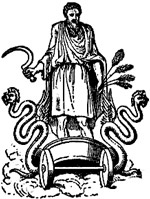 Father Time, The Cosmic Task Master, His Karmic Highness, Kronos, The Grim Reaper. These are just a few cozy nicknames for our beloved god of structure, form and time. Saturn, as the archetype of the world, is symbolic of the cosmos and the universe. He is the Guardian of Time, The Steady, The Controller, The Black, The End-Causer, The Famished, The Dance of Shiva, The Slain God, The Eternal Present and the Gatekeeper between the personal and the transpersonal realms of our psyche.
Father Time, The Cosmic Task Master, His Karmic Highness, Kronos, The Grim Reaper. These are just a few cozy nicknames for our beloved god of structure, form and time. Saturn, as the archetype of the world, is symbolic of the cosmos and the universe. He is the Guardian of Time, The Steady, The Controller, The Black, The End-Causer, The Famished, The Dance of Shiva, The Slain God, The Eternal Present and the Gatekeeper between the personal and the transpersonal realms of our psyche.
In Babylon, he was called Ninib and was an agricultural deity. The Greeks called him Kronos, the Protector and Sower of the Seed. (This was his assignation at the dawn of the Ages of the Gods.) He was one of the seven Titans, those Gods known for their size, strength, and immense power, until they were deposed by Zeus. When Gaia (Mother Earth) and Ouranos (Father Sky) got together and turned up the Barry White, they created the first inhabitants of the world. These were huge and scary characters, Cyclops and some other kids with fifty heads and such. Then came the Titans. But Ouranus was not a very proud dad, and sought to destroy the fifty headed children by burying them under the earth. Gaia was infuriated by her old man’s infanticidal tendencies, and sought help from her other children, the Cyclopes and the Titans. Of all the kiddies, only Kronos responded. He lay in wait for his dad and castrated him with a sickle. From Ouranus’s blood spilled yet more races of monsters, including the Giants and the Furies. But the good news for Kronos was that he became the ruler of the universe for untold ages. He married his sister Rhea and they reigned mightily for a time. But there was a prophesy that one of Kronos’s kids would try to depose him, so he decided to swallow them upon birth. (Nice guy, huh?) When the sixth child, Zeus, was born, Rhea stole him away to the island of Crete to protect him from Kronos’s wrath. (She gave Kronos a stone to swallow instead.) But Zeus eventually got a job as a cup-bearer to his dad, and gave him a poison potion that made him vomit up the swallowed siblings. A major war ensued. Zeus, ever the cunning warrior, convinced Prometheus (a Titan) and the fifty-headed monsters to join his team. Kronos and his cronies lost, and were banished to the Tatrarus, a dark, depressing place at the end of the earth.
In Roman mythology, Kronos became Saturn. Zeus was now Jupiter, and when he ascended the throne, Saturn fled to Rome and established the Golden Age. The feast of Saturnalia was celebrated at the winter solstice every year in memory of the Golden Age. This was a time when all executions were postponed, servants and masters ate at the same table, and gifts were given. Christians eventually appropriated this festival and named it Christmas. This is also why Capricorn, the sign that starts close to the winter solstice on December 21st, is associated with Saturn.
So Saturn has several sides, mythologically. Many tend to think of him as an all around bad guy, but we aim to show you his positive attributes.
In The Greatness of Saturn, the Vedic mythological tale of Saturn and respected Western translation of the myth by Dr. Robert E. Svoboda, we learn how and why Saturn brings us to our knees. It has traditionally been believed that the simple reading of this story was a way to please Saturn, so that in return he would provide comfort and aid and aid to all readers.
The story is about a King’s confrontation with Saturn’s true greatness. He learns a vital lesson: to be ready at any moment to lose attachment to the everyday world and sacrifice name and fame in order to go deeper within. This sort of sacrifice connects us to that which sustains us when nothing else will.
The encounter begins when the King, overcome by a negative state of mind, makes the grave mistake of denigrating Saturn in public court. Saturn, with his perfect timing, just so happens to be flying overhead at that exact moment. Saturn swoops down to greet the King who recoils in sheer panic, desperately wishing to take back his words and prostrate at Saturn’s feet. But his fate is sealed, his karma is set and the King is warned to prepare for misfortune.
After a series of tormenting experiences the King loses everything. Finally, when he is literally on his last leg, Saturn reappears to show mercy and even reward him for his patience and endurance of the suffering. He tells the King he will grant him anything he wishes. In sheer humility, the King only wishes that no one ever have to endure the kind of suffering he has endured, ever. Upon hearing this noble request, Saturn is so pleased with his wish to save all other beings from suffering that he returns to the King everything he has lost, including his kingdom, and more.
Saturn has a bad rep, and if you choose not to appease him, there can be consequences. But in myth and in life, and in the archetypal meeting place where both of these realms converge, we can learn to use Saturn as a friend rather than a foe.